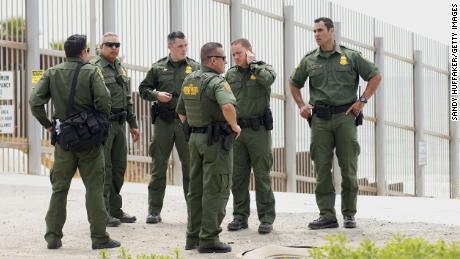Tijuana, Mexico (CNN)In this Mexican border city, a line of police stood in riot gear.
But the authorities weren't guarding against the thousands of migrants who've come to Tijuana in recent days on their journey to seek asylum in the United States.
They were blocking a crowd of protesters who had gathered Sunday near a sports complex where more than 2,000 Central American migrants are staying.
Police said they were standing guard after protesters pushed through fencing and tried to march toward the complex.
Waving Mexican flags and wearing patriotic colors, protesters told CNN there isn't enough space in Tijuana to house the growing number of migrants, who they accused of putting their city's security at risk.
"I feel offended. I feel hurt. I feel assaulted. I feel afraid. I have never felt that way in my city, and now I feel it, and that isn't fair," said Mariana Gonz├Īlez.
The Tijuana resident said her city already has enough problems and shouldn't put up with outsiders bringing more.
"They come here demanding things. And here you do not come to demand, you come to ask with honesty and with humility. I think the solution is to take them all back to their countries. ... They should go back to their countries and make demands of their own government," protester Damarys Mondrag├│n said.
But some locals dismissed the protests as a small gathering of fringe groups that don't represent views of most residents of Tijuana, where more than 1 million people live.
"We have to support the migrants and show solidarity as human beings," said Tijuana resident Eugenia Arsola, "not give hateful speeches or promote hate."
Alberto Rivera said a serious problem had crept into the border city, but it wasn't the migrants.
"The problem that has entered and infiltrated Tijuana is the political doctrine of Donald Trump. And the political doctrine of Donald Trump is to divide, to divide between races, cause disturbances, cause problems, tension, hate," he said. "And it's sad that some here from Tijuana have taken Trump's bait."
More than 2,000 Central American migrants arrived in the border city of Tijuana in recent days, and about 3,000 more migrants are estimated to be in Mexicali, Mexico, another border city about 100 miles away, UNHCR spokeswoman Francesca Fontanini said.
As large groups of migrants trekked through Mexico for weeks, many noted the outpouring of support they received along their journey.
In southern Mexico, residents rushed to the streets to hand out food and donated clothes to passing migrants.
But in northern Mexico, where migrants could remain for weeks or even months as they wait to make asylum claims in the United States, some residents have been raising concerns for days about how the region will cope.
In Tijuana, officials have complained that federal authorities in Mexico aren't doing enough to help deal with the influx.
Mexico historically has had a complex relationship with Central American migrants.
For years, on the often-dangerous journey through Mexico, migrants from Central America have fallen prey to cartel violence and faced harsh criticism from locals.
A public opinion survey last month from El Universal newspaper found that not everyone is ready to roll out the welcome mat for the new groups of migrants traveling through the country.
Asked how they felt about undocumented Central American immigrants being allowed to enter Mexico and being granted refuge, 47.8% of respondents agreed, while 37.8% were against it. Others said they were undecided or didn't have a strong feeling either way. According to the newspaper, nearly a third of those surveyed said they believed undocumented migrants should be expelled from the country immediately.
Long after the weekend protest had ended, tensions were still running high in some corners of Tijuana.
Police said they arrested a Tijuana resident Monday after she entered the sports complex and started verbally attacking migrants there.
Meanwhile, north of the border, US officials shut down northbound traffic at the San Ysidro port of entry for about three hours Monday so they could reinforce security.
Department of Homeland Security officials said the closure occurred because they'd received information from "multiple sources, including individuals in the Mexican government" about groups who were reportedly communicating about plans for an incursion into legal ports of entry by attempting to pass through vehicle lanes.









